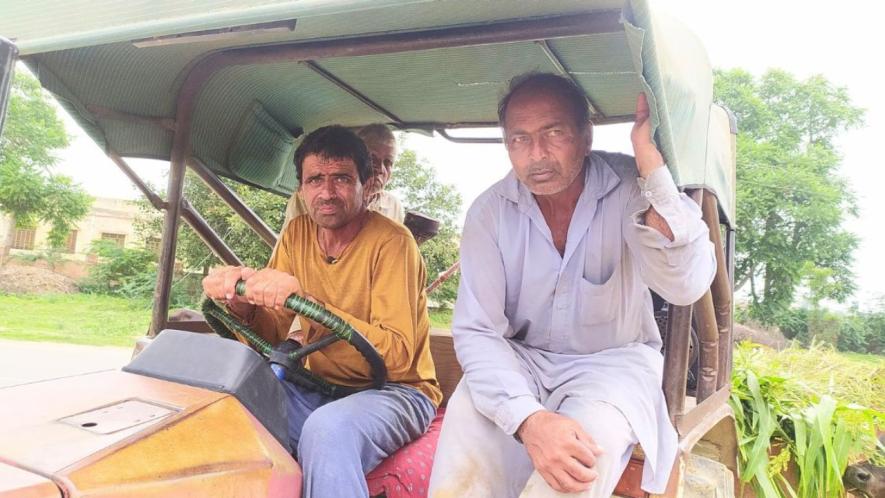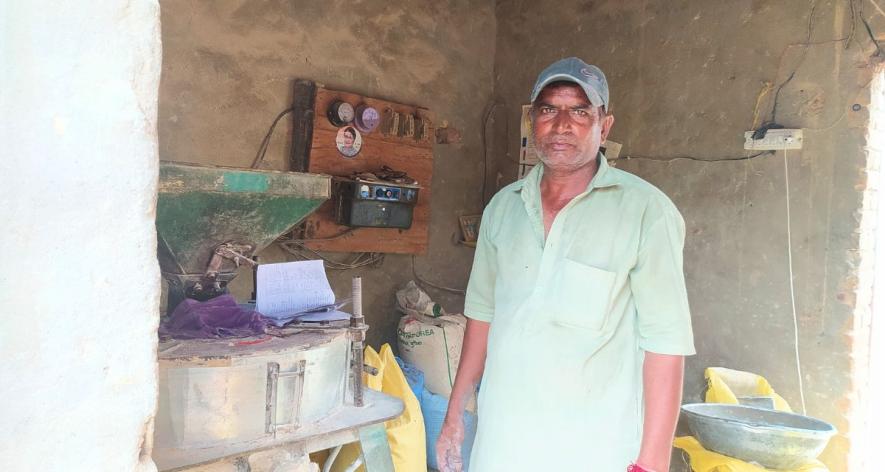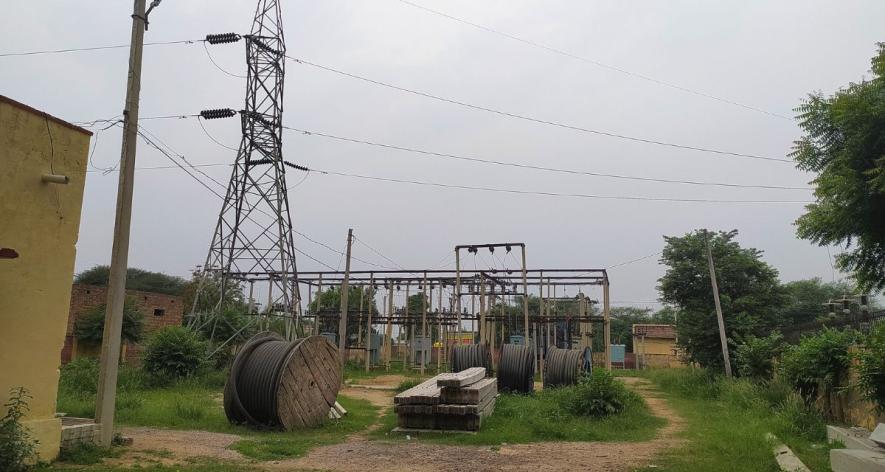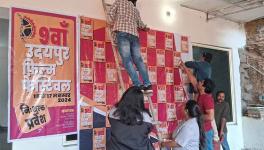Rajasthan: Power of Protest Fails to Light up Lives in Nethrana Village in Hanumangarh District

Residents waged a three-year battle against erratic power supply by not paying electricity bills (Photo - Amarpal Singh Verma, 101Reporters) .
Hanumangarh, Rajasthan: Even fans will not run on scorching summer days at Nethrana in Bhadra tehsil of Rajasthan’s Hanumangarh district, thanks to the highly erratic power supply.
“Electricity for 24 hours a day is still a dream for us. Although there has been an improvement in power supply after rains, power cuts do occur,” said village sarpanch Rajendra Nimiwal.
Under the aegis of Bijli Upbhokta Sangharsh Samiti, Nethrana residents launched a movement in September 2019, raising demands such as smooth supply of electricity, replacement of faulty meters, cancellation of increased security amount and fixed charges, and 200 units of free electricity. They decided not to pay bills until their demands were met. They staged demonstrations and went on hunger strike. Three years passed by in no time.
Of about 1,900 electricity consumers in the village, about 1,500 did not pay the bills. The outstanding dues touched Rs 3.40 crore. Electricity officials repeatedly urged them to pay up, but villagers did not budge. Finally, in May 2022, the department staff reached the village with heavy police force and started disconnecting the supply to those households that had not cleared the bills. About 700 connections were cut, of which about 225 consumers deposited the outstanding amounts and restored the connection.
Subsequently, in October 2022, the connections of about 250 people were again disconnected. The agitation continued for months in protest against the disconnection. Cases were registered for obstructing government work and many villagers were arrested. The agitation ended after an agreement was reached between the villagers and Jodhpur Vidyut Vitran Nigam Limited (JDVVNL).
In the agreement, it was decided to waive the interest and penalty charged in three years and recover the outstanding bill in instalments. Faulty electricity meters were changed following the agitation. However, a lot more needs to be done to improve the power system.

Electricity for 24 hours a day is still a dream for the villagers (Photo - Amarpal Singh Verma, 101Reporters).
Dozens of villagers were forced to make rounds of the court in connection with the cases filed during the movement that got statewide attention. Farmer Shailendra Kumar (35), who was arrested and sent to jail on charges of obstructing discharge of duty, told 101Reporters that nothing has been done to ensure that villagers get uninterrupted power supply 24 hours a day. “Undeclared power cuts in June and July amid the summer heat were distressing,” he said.
He added that tube well irrigation and functioning of small businesses like flour mills were affected. “We also submitted a memorandum to the JDVVNL assistant engineer at Gogamedi in protest against the power crisis, but he replied that power supply to rural areas were cut on the orders of higher officials from Jaipur.”
Village Development Officer Gajanand said that the computers in the village panchayat could function smoothly only because of the solar panels installed there.
JDVVNL Assistant Engineer Ishwar Singh admitted that load shedding is done only on rural feeders on the orders of the government. “This cannot be done in cities. Just as at Nethrana, power cuts happen in other villages too. There is no other option when consumption increases,” Singh said.
Shailendra said the poor of Nethrana could not pay the combined bill of three years, so about 300 houses are still in the dark. . However, the assistant engineer said it was only about 100. “We are ready to reconnect after taking the principal amount from these people without any interest and penalty,” he added.
Nethrana gets its power supply through a rural feeder, hence there is a power crisis. On the other hand, Ratanpura village near Sangaria is connected to urban feeder, yet the villagers faced frequent power cuts and tripping for two months. Electrical appliances in many households were damaged due to voltage fluctuations.
Ratanpura native Hariram Nayak (36) said that his village did not face power cuts for several hours. The problem here was frequent power cuts at night. "We remain disturbed throughout the day as we cannot sleep properly at night. Even fans do not work," he said.
Aman Kumar (36) said that the problem of low voltage and blowing of transformer fuses have been frequent in the summer. Due to voltage fluctuations, there have been instances of coolers and fans getting damaged.
Electrician Bhola Singh explained that load increases when voltage is too low. This may cause overheating that can damage the insulation layers of the wiring of the appliance. This can potentially lead to a fire. "For most of the household appliances, a minimum of 200V is required for proper functioning. If voltage is above 240V, then also the appliances get damaged. I deal with both these cases on a regular basis," he added.

Electricity for 24 hours a day is still a dream for the villagers (Photo - Amarpal Singh Verma, 101Reporters)
Farmers Pradeep Kumar Saharan (40) and Bhagwant Saharan (42) said that the time for supplying electricity to tube wells is from 5 am to 11 am and from 5 pm to 11 pm, but the electricity trips a lot in summer. Once the power goes off, it is not restored for another hour. "I have cotton and green gram in my fields. I used to worry whether the plants would wilt due to lack of timely irrigation. However, despite the issues in irrigation, I did not face losses," he added.
Flour mill operator Mahavir Dhil (44) said power tripping affected him a lot. "I used to grind three to four quintals of wheat every day, at the rate of Rs 200 per quintal. I also take 2.5 kg of flour for every quintal of wheat grinded. There has been no change in the amount of wheat ground or money received. But usually I work from morning to evening. This has now extended to night due to erratic power supply," he explained.
Ratanpura's Village Development Officer Subhash Bangarwa told 101Reporters that he has been posted in the village for two-and-a-half years, but it was this time that the village saw the highest number of power outages.
“The solar system in the village panchayat office is not working. We manage with an inverter. There were times when battery backup of the inverter was exhausted and our computers could not work. Due to this, work of uploading information related to MGNREGA, panchayat and birth-death registration got disrupted, he said.
Bangarwa acknowledged that complaints of power crisis and the resultant disruption in drinking water supply were received in the panchayat-level public hearing and village panchayat meeting in both July and August.
“In the fortnightly meeting of the panchayat, panch Suman Devi and others demanded that a solution be found to unannounced power cuts, low voltage, loose wires and burning of transformers. We called the assistant engineer and informed him about the problems. He got the loose wires fixed immediately, but said that he had no control over power cuts caused by power shortage. At the panchayat level public hearing also, people informed us about the problems related to electricity and water supply,” Bangarwa detailed.
The industrial area of Ratanpura also faces a power crisis. “Tall claims are made that enough electricity will be provided to industries, but we always face a power crisis... If there is a malfunction anywhere in the area, the main line is shut down, due to which work in the industrial area is stopped,” said Ganesh Goyal, secretary, Ratanpura Industries Association.
He added that even after three decades, the Ratanpura industrial area has not been fully developed due to irregular power supply. Currently, there are 15 oil, seed and wooden factories, of which two have been closed. However, while speaking to 101Reporters, JDVVNL junior engineer Saurabh Doodi claimed that Ratanpura is connected to the city line, so the area has not come under load shedding for even one day. “We have supplied electricity for 20 to 24 hours.”
He admitted that there were some problems in villages due to rain, storm and overload. “Tripping is natural during rain and storm due to loose wires, but we get repairs done immediately. If fuse blows, or wire or transformer burns, shutdown is needed to fix it. Otherwise, we try our best to provide electricity to consumers,” he maintained.
(Amarpal Singh Verma is a Rajasthan-based freelance journalist and a member of 101Reporters, a pan-India network of grassroots reporters.)
Get the latest reports & analysis with people's perspective on Protests, movements & deep analytical videos, discussions of the current affairs in your Telegram app. Subscribe to NewsClick's Telegram channel & get Real-Time updates on stories, as they get published on our website.
























